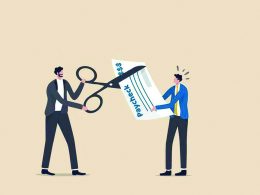Fear of recession in the US, its credit rating downgrade and political dysfunction, not to mention the ongoing eurozone crisis, Japanese stagnation and slowdown in China, have all led to convulsions on world stock markets. socialistparty.net reports.
The world economy appears to be sliding into a ‘double-dip’ recession or, more accurately, a continuation of the ‘great recession’ of 2008-09, following a feeble ‘recovery’ in 2010. The advanced capitalist countries are most severely affected, but the brightly burning furnaces of the semi-developed giants of China, India and Brazil (so-called ‘emerging markets’) are beginning to flicker. Until recently, signs of a slowdown which appeared in the second quarter of 2011 were regarded by many capitalist commentators as merely a ‘soft patch’. But the outlook changed dramatically with the convulsions in global stock exchanges during the first three weeks of August.
Trillions of dollars were wiped off the value of shares, with bank shares being especially hit. This is in spite of the high profits garnered by big business in the last period, and their huge cash reserves. The volatility and sharp decline – not at this stage a crash – reflect fear of an economic downturn and a collapse of profits in the future. Huge amounts of money have been taken out of company shares and transferred to so-called ‘safe havens’. In the first three weeks of August, $42 billion was taken out of equity funds. Financial institutions and big investors have moved from shares to government bonds (notably the US and Japan), to gold (pushed up to almost $1,900 an ounce), and cash deposits in Switzerland (Swiss banks are now charging fees for deposits, effectively a negative interest rate!).
The stock exchange volatility was triggered by a series of events, all interconnected and symptomatic of an underlying slowdown in the global economy. One financial analyst described the situation as “an imperfect storm of downgrades, rumours, lacklustre macroeconomic data and the ongoing eurozone debt crisis [which] transformed a retreat by investors into something approaching a stampede”. (Financial Times, 13 August) Investors fled from risk and sought ‘safe havens’.
The confidence of investors internationally was shaken by the struggle between Barack Obama and the US Congress over raising the country’s debt limit and the subsequent downgrading by S&P of the US government’s credit status. The battle over the $14.5 trillion national debt highlighted the dysfunctional character of the US political process. A minority of Tea Party Republicans appeared ready to plunge the country into default rather than accept even very limited tax increases on the wealthy to help reduce the deficit. While many commentators regarded a US default as ‘inconceivable’, others were not so sure.
In downgrading the US debt status from AAA to AA+, the rating agency S&P referred not only to the absolute level of debt but the dysfunctional process. “The effectiveness, stability, and predictability of American policy-making and political institutions have weakened at a time of ongoing fiscal and economic challenges”, S&P wrote in its downgrade report. The rating agency Fitch later confirmed the US’s AAA rating. In any case, when shares plunged funds poured into US Treasury bonds, despite S&P’s downgrade. The US is still seen as a safe haven, even when T-bond yields are reduced to record lows. However, the episode has clearly left its mark: “Once unthinkable things have happened, such as the US losing its AAA rating”, commented an analyst at Barclay’s Capital. “Investors are literally feeling the earth shifting under their feet; you just don’t know what else you thought of as rock solid might turn out to be untrue”. (Reuters, 15 August)
Temporary fixes
By early August it was clear that the 21 July deal agreed by eurozone leaders had far from resolved the eurozone crisis. Renewed fears of defaults in eurozone government bonds were also leading to doubts about banks believed to be holding large quantities of sovereign debt. The situation was intensified by a statement from José Manuel Barroso, head of the European Commission, who said there was “a growing concern among investors about the systemic capacity of the area to respond to the evolving crisis”. This statement, in itself, intensified the turmoil on bond markets.
It had been agreed that Greece should be given another loan of €109 billion. However, this, as with other sections of the deal, is subject to approval by the national governments or parliaments of the 17 eurozone members. There are growing doubts as to whether even the German parliament, the Bundestag, will ratify the agreement. Moreover, Finland has subsequently demanded that Greece provides collateral (security) in the form of certain assets (not so far specified publicly) to guarantee their share of the new loan. This opens up the possibility of other eurozone governments demanding similar collateral, which could make the loan financially unviable or politically unacceptable for cash-strapped Greece.
The summit also agreed to extend the powers of intervention of the EFSF (European Financial Stability Facility), but did not raise the very modest €440 billion funds available. Again, any real extension of EFSF powers depends on the approval of national parliaments.
This situation led to renewed, intensive speculation against the bonds of some eurozone governments and also the shares of banks holding euro bonds. This was not so much directed, at this stage, against the bonds of Greece, Portugal and Ireland because the European Central Bank had (somewhat reluctantly) already been intervening to buy their bonds, thus sustaining their prices.
Speculators, however, began to bet on a fall in the prices of the sovereign bonds of Italy, Spain and later France. This speculation began to drive up the borrowing costs of these countries. It also brought a sharp fall in the share prices of major banks. Notably, there was an especially sharp fall in shares of the French bank, Société Générale, following rumours (in the Daily Mail) that it was in trouble.
A major crisis in eurozone sovereign debt/banking was averted by a u-turn in ECB policy. Under pressure from Germany and France, the ECB agreed to start buying the bonds of Spain, Italy and France to sustain their price and ward off speculators. This has temporarily stabilised the position. But it is far from clear how much longer the ECB will continue this intervention. Some members of the ECB board are openly opposed to this policy, as is the Bundesbank. Once again, there is a temporary fix to the ongoing eurozone crisis, not a resolution.
In recent weeks there have also been renewed fears of a new round of banking crisis. Since 2008 some banks have reduced their debts and increased their capital reserves. Others, however, are still heavily weighed down by bad debts and may not have sufficient reserves to withstand another major downturn. But the position of different banks is far from transparent. This has resulted in a growing reluctance of banks to lend to one another through interbank money markets. News that one unnamed European bank had borrowed 500 million US dollars from the ECB sparked rumours that a major bank was in trouble and had been refused funding by US banks. As a result of this and other incidents, banks have increasingly been depositing their spare cash with central banks, even though this pays lower interest rates than the commercial money-market funds. While not yet as severe as in 2008, this trend carries the threat of a new credit squeeze like that of 2008, with banks being reluctant to lend to any customers perceived as risky.
Above all, however, it was the accumulating reports of a slowdown in the major capitalist economies that triggered the stock exchange falls. In the US, GDP growth fell to 0.8% (annualised) compared to 3% last year. Around 24 million workers are looking for full-time jobs. Moreover, a recent survey of manufacturing in Pennsylvania and New Jersey predicts a sharp decline in coming months.
In Japan, growth has declined for the third consecutive quarter, falling 0.3% in the second quarter of 2011. The rising value of the yen against the US dollar, propelled by the influx of cash in search of a safe haven, will make Japan’s exports more expensive, further cutting across growth. In Britain, the economy is stagnant, depressed by the austerity measures of the Con-Dem government. The economies of the two largest eurozone countries, Germany and France, are also stagnant. Even German growth, previously the most dynamic, has ground to a halt. This is partly the result of weak domestic demand (with a severe squeeze on wage levels in recent years) and, most significantly, a decline in exports to China (down 12%). Overall eurozone industrial output for May and June, moreover, declined by 0.7%. In Greece, as a result of savage austerity measures, the economy is likely to decline by 5% this year. The outlook is bleak and the slide in share prices reinforces the gloom. “Market crashes stoke a negative spiral”. (Financial Times editorial, 20 August)
A new credit squeeze?
The new downturn is a prolongation of the 2008-09 recession, but a new phase of the crisis with different features. This time, it is not the banks and shadow banking network that have precipitated a broader economic crisis, but an economic slowdown which, together with the sovereign debt crisis, has precipitated a new phase of banking crisis. Although the position of most banks does not appear to be as bad as in 2008, there is the distinct possibility of a new credit squeeze as bank lending dries up. Some banks themselves would be hit by such a squeeze, and further bank failures certainly cannot be ruled out.
From the end of 2009 until early 2011 there was a feeble, uneven recovery. It depended on a number of factors. There was short-term fiscal stimulus, with increased government spending in the US, Britain, Japan, and core European countries. There was also an extremely loose money policy carried out by the major central banks in the US, Japan and Europe. This has meant near zero interest rates and, in one form or another, quantitative easing – the pumping of additional credit into the economy on the basis of ‘creating’ (ie printing, in old fashioned terms) money. The world economy was also sustained by the continued high growth rates in major developing economies, notably China, India and Brazil (which benefitted from additional investment derived from quantitative easing and also from the huge stimulus package of the Chinese regime).
However, massive problems remain, particularly the huge burden of state and private debt. State budget deficits and accumulated national debt have soared, partly due to bank bailouts and fiscal stimulus, but mainly due to low or negative growth, which slashed tax revenues and increased spending on unemployment benefits, etc. Household debt also remains a huge burden, depressing consumer spending, the main component of GDP in most advanced capitalist countries. Some companies, particularly in commercial property, have big debts (and some may well default in the coming months). On the other hand, many big corporations are sitting on huge piles of cash: they are not interested in investing this capital in new plant and machinery because it would not be profitable given existing levels of money-backed demand. Many have taken advantage of the recent fall in share prices to buy back their own shares, thus boosting their share prices while handing a bonus to their shareholders.
Given generally weak domestic demand, export growth has been seen as an important way out of the recession. However, there is intense competition for limited markets. In the case of the eurozone countries, they do not have the possibility of devaluing their currency in order to cheapen their exports and gain market share. Germany did manage previously to boost its exports (mainly on the basis of the quality of its manufactured goods), but has recently suffered a fall in exports as a result of the downturn in Japan and a slowing of manufacturing in China and elsewhere.
Bitter policy debates
The capitalist class internationally faces not only an economic crisis but a political crisis of economic policy. A whole range of policies has been tried – to no avail, giving way to renewed recession. Bank bailouts in 2008-09 and stimulus packages prevented a catastrophic collapse of the world economy on the lines of 1929-33. But the solvency of some banks is now threatened by the sovereign debt crisis. Stimulus packages in the US and Europe have run their course. Priority is now being given to severe austerity measures in order to reduce deficits and accumulated debt. This is clearly having the effect of depressing growth, which is likely to lead to even higher deficits in the future.
Deficit reduction, however, has been the dominant ideology of big business (‘financial markets’) and the policy adopted by most political leaders (including those of former social-democratic parties). But even some bourgeois leaders and heads of financial institutions have begun to change their tune. For instance, the new head of the International Monetary Fund, Christine Lagarde, recently called for some countries (unspecified, but no doubt meaning Germany, Japan, the US and possibly Britain) to introduce short-term fiscal stimulus while preserving their commitment to medium-term fiscal austerity (a tricky balancing act!). (Don’t Let Fiscal Brakes Stall Global Recovery, Financial Times, 15 August) There is no indication at the moment of any major government adopting such a course, but in the face of an even deeper downturn in the world economy capitalist leaders will undoubtedly be forced to change direction in order to avoid economic collapse. The recent public-sector strikes in Britain are, in their different ways, a foretaste of the social upheavals to come. In this new phase of recession, which is likely to be protracted, the working class will be more prepared to struggle against austerity measures than in 2008-09, when the sharp downturn came as a sudden shock.
Bitter debates are also taking place in relation to monetary policy. While political leaders have been restrained by pressure from big business from adopting stimulus measures, the central banks have, to one degree or another, adopted measures to stimulate growth. For instance, both the Federal Reserve in the US and the Bank of England have reduced interest rates to near zero and adopted so-called quantitative easing programmes. The pumping in of credit into the economy has undoubtedly prevented the collapse of many banks and corporations, though it has had a limited effect in stimulating growth. At the same time, as critics point out, a large slice of the credit was diverted to speculative investments in ‘emerging markets’.
Quantitative easing, however, has been bitterly attacked by some sections of big business and ultra-free-market politicians. In the US, for instance, some members of the Federal Reserve board are strongly opposed to quantitative easing. Recently, Rick Perry, a contender for the Republican presidential nomination, denounced Ben Bernanke as a traitor for printing money. Similarly, in the eurozone, there is strong opposition to the ECB’s policy of buying government bonds in order to support their price levels. Three members of the ECB board (including the representative of Germany) and also the Bundesbank oppose this policy (even though the ECB has attracted deposits from banks that cancel out the value of the bond purchases).
Critics of quantitative easing argue that it is inevitably inflationary. However, much of the extra liquidity is actually hoarded by banks and financial institutions and, given the generally deflationary trends in the major economies, is not at this stage inflationary, though it certainly has the potential to cause inflation in the future. In reality, the ‘inflation hawks’ are like generals fighting past wars. In this period, the main threat to capitalism globally comes from deflation, the stagnation of the economy, the fall in prices, and the increase in the burden of debt. More and more, commentators are referring to the ‘Japanisation’ of the world economy, a reference to the 17-year stagnation of Japanese capitalism.
Keynesian-type stimulus packages, particularly if they involved infrastructure projects which create employment and boost unemployment benefits, would mitigate the downturn. Sections of big business that previously denounced Keynesianism as unredeemed evil are now beginning to call for such measures. Even the Financial Times, previously a pillar of neo-liberal doctrine, says that “for those with room for fiscal manoeuvre, there is a case for a more relaxed approach to economic belt-tightening”. (Ghost of Keynes Haunts Eurozone, 16 August)
Keynesian measures, however, would only be a short-term fix (as even John Maynard Keynes himself recognised). They would inevitably increase the indebtedness of states, and such debt could only be paid off on the basis of sustained growth. However, under capitalism sustained growth depends on sustained investment, which will only take place if the big corporations and capitalist investors believe that they will make adequate profits from their investments. In this period, capitalism cannot secure the combination of high investment levels and sustained productivity growth that would be needed to combine rapid growth, good wages, high social spending – and big profits. Ultimately, that proved to be beyond capitalism even during the ‘golden age’ (1945-73) of the post-war upswing. Today, as recent events show, we are facing the ‘bleak age’ of the crisis-ridden system.











